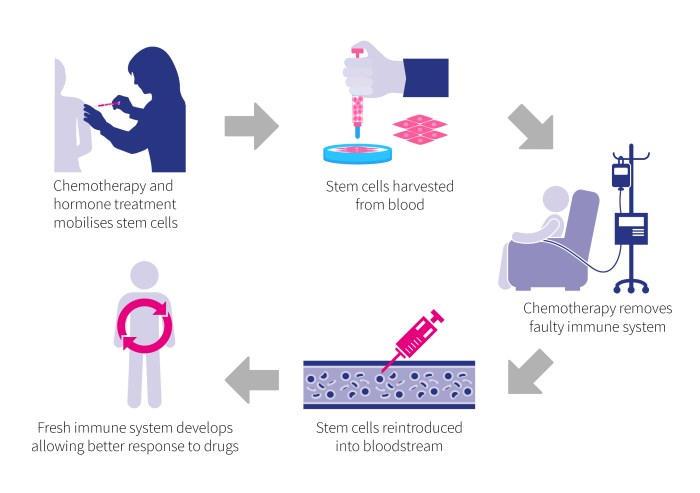Delving into the realm of new breakthroughs in treating Crohn’s Disease worldwide, this article aims to provide a detailed exploration of the latest advancements in the field. From cutting-edge therapies to personalized medicine approaches, the landscape of Crohn’s Disease treatment is evolving rapidly.
Overview of Crohn’s Disease Treatment

Crohn's disease is a chronic inflammatory condition that affects the gastrointestinal tract, causing symptoms such as abdominal pain, diarrhea, and fatigue. Over the years, several treatment approaches have been developed to help manage the symptoms and improve the quality of life for individuals with Crohn's disease.
Current Standard Treatments
The current standard treatments for Crohn's disease typically involve a combination of medications, lifestyle changes, and sometimes surgery. Medications such as anti-inflammatory drugs, immunosuppressants, and biologics are commonly used to reduce inflammation in the intestines and control symptoms. In addition, dietary modifications, stress management, and regular exercise can also play a role in managing the disease.
History of Treatment Methods
In the past, treatments for Crohn's disease were limited and often focused on symptom management rather than addressing the underlying cause of the inflammation. Surgical interventions, such as bowel resections, were common, but they did not always provide long-term relief.
As our understanding of the disease has advanced, more targeted and effective treatment options have become available.
Challenges in Treating Crohn’s Disease
One of the main challenges in treating Crohn's disease is the variability in the way the disease presents and progresses in different individuals. This can make it difficult to find a one-size-fits-all treatment approach, leading to a trial-and-error process to determine the most effective treatment for each patient.
Additionally, the chronic nature of the disease and the potential for flare-ups and complications pose ongoing challenges for both patients and healthcare providers.
Effectiveness of Different Treatment Approaches
While there is no cure for Crohn's disease, the goal of treatment is to achieve and maintain remission, where symptoms are minimal or absent. Different treatment approaches vary in their effectiveness depending on the individual patient and the severity of their disease.
Some patients may respond well to medication alone, while others may require a combination of medications and lifestyle modifications to manage their symptoms effectively.
New Breakthrough Therapies

Crohn's disease treatment has seen significant advancements globally, with new breakthrough therapies revolutionizing the approach to managing this condition. These innovative treatments offer hope to patients by providing more effective and targeted options to control the symptoms and progression of the disease.
Mechanisms of Action
These new therapies often target specific pathways involved in the inflammatory process characteristic of Crohn's disease. For example, some medications work by inhibiting certain proteins or molecules that play a key role in triggering and sustaining inflammation in the digestive system.
By blocking these pathways, the medications help reduce inflammation, alleviate symptoms, and promote healing of the intestinal tissue.
Changing the Treatment Landscape
The introduction of these breakthrough therapies has significantly changed the landscape of Crohn's disease treatment. Patients now have access to more personalized and targeted approaches that can lead to better outcomes and improved quality of life. These therapies have the potential to reduce the need for frequent hospitalizations, surgeries, and long-term steroid use, offering a more sustainable and effective way to manage the disease.
Comparing Efficacy and Side Effects
When comparing the efficacy and side effects of new therapies with traditional treatments for Crohn's disease, research studies have shown promising results. While traditional treatments like corticosteroids and immunosuppressants may have been effective in managing symptoms, they often come with significant side effects and limitations in long-term use.
In contrast, the new breakthrough therapies have shown to be more effective in inducing and maintaining remission, with fewer side effects and a better safety profile overall.
Personalized Medicine in Crohn’s Disease Treatment
Personalized medicine in the context of treating Crohn’s disease involves tailoring treatment plans to individual patients based on their unique genetic makeup, lifestyle factors, and disease characteristics. This approach recognizes that not all patients will respond the same way to standard treatments and aims to provide more targeted and effective therapies
Revolutionizing Treatment Strategies
Personalized approaches are revolutionizing treatment strategies for Crohn’s disease by shifting the focus from a one-size-fits-all approach to a more patient-centered model. By analyzing genetic markers, biomarkers, and other relevant data, healthcare providers can better predict how a patient will respond to certain medications or interventions.
This allows for the customization of treatment plans that are more likely to be effective and reduce the risk of adverse reactions.
- Genetic testing: By analyzing a patient's genetic profile, healthcare providers can identify specific genes that may influence their response to certain medications. For example, genetic testing can help determine if a patient is likely to metabolize a drug quickly or slowly, which can impact dosing and treatment effectiveness.
- Biomarker analysis: Biomarkers are biological indicators that can provide insight into disease activity and treatment response. By monitoring specific biomarkers in Crohn’s patients, healthcare providers can adjust treatment plans in real-time based on disease progression and individual response.
- Lifestyle modifications: Personalized medicine also takes into account lifestyle factors such as diet, stress levels, and physical activity. By incorporating these factors into treatment plans, healthcare providers can help patients make targeted lifestyle changes that can improve disease management and overall well-being.
Personalized medicine has the potential to transform the way we approach Crohn’s disease treatment, offering patients more precise and effective therapies tailored to their unique needs.
Impact on Patient Outcomes
The impact of personalized medicine on patient outcomes in Crohn’s disease is significant. By customizing treatment plans to each patient’s specific characteristics, healthcare providers can improve treatment response rates, reduce the risk of side effects, and enhance overall quality of life.
Patients may experience fewer disease flares, reduced hospitalizations, and better long-term disease management with personalized approaches.
Emerging Technologies and Innovations

In the field of Crohn’s disease treatment, emerging technologies and innovations have been instrumental in improving patient care and outcomes. These cutting-edge advancements have revolutionized the way healthcare providers approach the management of this chronic condition.
Telemedicine in Crohn’s Disease Treatment
Telemedicine has emerged as a game-changer in the treatment of Crohn’s disease, especially in remote or underserved areas. This technology allows healthcare professionals to remotely monitor patients, provide consultations, and adjust treatment plans without the need for in-person visits. By leveraging telemedicine, patients with Crohn’s disease can receive timely and personalized care, leading to improved disease management and quality of life.
Role of Artificial Intelligence in Disease Prediction
Artificial intelligence (AI) has shown great promise in predicting disease progression and optimizing treatment strategies for individuals with Crohn’s disease. By analyzing vast amounts of patient data, AI algorithms can identify patterns, predict flare-ups, and recommend personalized treatment plans. This innovative approach not only enhances the efficiency of healthcare delivery but also helps healthcare providers make informed decisions based on real-time data and insights.
Technological Advancements in Managing Crohn’s Disease
- Wireless Capsule Endoscopy: This non-invasive technology allows healthcare providers to visualize the entire gastrointestinal tract, enabling early detection of inflammation and complications in patients with Crohn’s disease.
- Biosensors and Wearable Devices: These devices can track vital signs, medication adherence, and disease activity in real-time, providing valuable data to healthcare providers for monitoring and adjusting treatment plans.
- 3D Printing for Personalized Treatment: 3D printing technology enables the creation of customized medical devices and implants tailored to each patient’s unique anatomy, offering more precise and effective treatment options for individuals with Crohn’s disease.
Last Word
In conclusion, the landscape of treating Crohn’s Disease is witnessing a transformative shift with the emergence of new breakthroughs and technologies. Patients can now look forward to more personalized treatment plans and better outcomes, marking a promising future in the fight against this challenging condition.
FAQ Explained
Are the new therapies for Crohn’s Disease available globally?
Yes, these breakthrough treatments are being adopted worldwide, offering hope to patients in various regions.
How do personalized treatment plans benefit Crohn’s Disease patients?
Personalized plans cater to individual needs, optimizing treatment effectiveness and potentially improving outcomes.
What role does artificial intelligence play in treating Crohn’s Disease?
AI assists in predicting disease progression and tailoring treatment plans for better management.









